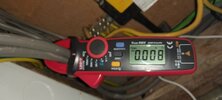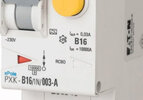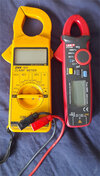In my large cellar, I have three 2 x 4ft (Class 1) fluorescent fittings, all of which were retrofitted with LED tubes a few years ago (without bothering to remove ‘ballasts’), all ofwhich have Indi dual switches (but usually all left ‘on’ with control by a single upstream switch), plus a few individually-switched LEDs in batten holders. The only other loads on the (6A) circuit (in a mini-CU, with 30 mA RCD in cellar) are three PIR detectors.
For years there have been no problems and the lights ate usually switched on and off a good few times every day. However, for the last few weeks, the RCD has occasionally (probably only once per week, or less) tripped when I have switched (all) of the lights on. When this happens, there are often two or three further trips when I switch the lights on after resetting the RCD, but the trips usually stop after that.
A few days ago, it was worse - every time I reset the RCD, there was a trip when I tried to switch the lights back on. I therefore went around switching the fluorescent fittings off one at a time, and found that the trips stopped when I switched one of them off. However, when I switched the fitting back on, there were still no trips, so it could have been just a ‘co-incidence’ that trips had stopped when I switched it off.
The fluorescent fittings are all Class I, with CPC connected only to the casing and nothing else. None of the CPCs at the batten holders and PIRs are connected to anything - and the cellar is generally ‘dry’. On testing, the RCD consistently trips at about 25 mA.
The only thing I could think of was that there may have been a leakage to earth (metal case of fitting) from one of the chokes (‘ballasts’) or Power Factor Correction capacitors (both of which are metal-bodied) in one of the fittings. Starting with the fitting I had ‘identified’, I removed the chokes and PFC capacitor. That was a few days ago, and there have been no trips since - but, given the intermittent history of the problem, that doesn’t prove much.
On doing IR testing on the removed chokes and PFC, I found that one of the chokes had an IR to its case of about 300 kΩ (at 250V, 500V and 1,000V) and that one side of the capacitor had an IR of about 150 MΩ to its case, but only at 1,000V. However, none of that is really not enough to explain trips, hardly enough to be ‘the last straw’ if similar (but worse)) leaks existed in other fittings.
So, I’m currently in ‘wait and see’ mode (and probably will remove all the other chokes and PFCs, anyway). In the meantime, has anyone got any other observations or suggestions, since this has the potential to become a nightmare if the problem persists?
Kind Regards, John
For years there have been no problems and the lights ate usually switched on and off a good few times every day. However, for the last few weeks, the RCD has occasionally (probably only once per week, or less) tripped when I have switched (all) of the lights on. When this happens, there are often two or three further trips when I switch the lights on after resetting the RCD, but the trips usually stop after that.
A few days ago, it was worse - every time I reset the RCD, there was a trip when I tried to switch the lights back on. I therefore went around switching the fluorescent fittings off one at a time, and found that the trips stopped when I switched one of them off. However, when I switched the fitting back on, there were still no trips, so it could have been just a ‘co-incidence’ that trips had stopped when I switched it off.
The fluorescent fittings are all Class I, with CPC connected only to the casing and nothing else. None of the CPCs at the batten holders and PIRs are connected to anything - and the cellar is generally ‘dry’. On testing, the RCD consistently trips at about 25 mA.
The only thing I could think of was that there may have been a leakage to earth (metal case of fitting) from one of the chokes (‘ballasts’) or Power Factor Correction capacitors (both of which are metal-bodied) in one of the fittings. Starting with the fitting I had ‘identified’, I removed the chokes and PFC capacitor. That was a few days ago, and there have been no trips since - but, given the intermittent history of the problem, that doesn’t prove much.
On doing IR testing on the removed chokes and PFC, I found that one of the chokes had an IR to its case of about 300 kΩ (at 250V, 500V and 1,000V) and that one side of the capacitor had an IR of about 150 MΩ to its case, but only at 1,000V. However, none of that is really not enough to explain trips, hardly enough to be ‘the last straw’ if similar (but worse)) leaks existed in other fittings.
So, I’m currently in ‘wait and see’ mode (and probably will remove all the other chokes and PFCs, anyway). In the meantime, has anyone got any other observations or suggestions, since this has the potential to become a nightmare if the problem persists?
Kind Regards, John




